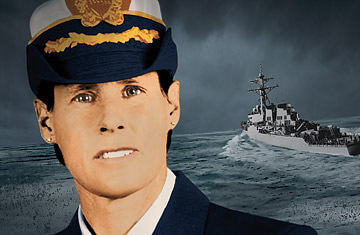
(2 of 5)
Graf alternated tours aboard a destroyer tender, a frigate and a destroyer with shore assignments at the Pentagon and as a Navy ROTC instructor at Villanova University, outside Philadelphia. She earned a Bronze Star during the Iraq war (along with the Legion of Merit, Defense Meritorious Service Medal and two Meritorious Service Medals). Adding some academic heft to her résumé, Graf earned three master's degrees--in national security from the Naval War College, in civil engineering from Villanova and in systems analysis from the Naval Postgraduate School. Early in her career, there were few signs of the abusive commander she would become. "I knew Holly a long time ago," wrote one acquaintance on a naval blog last week. "My memory of her is nothing like how the posts on this and other boards are portraying her."
Graf's darker side began to emerge when she was assigned to the destroyer U.S.S. Curtis Wilbur in 1997, as the executive officer (XO), or second in command. Kirk Benson, who retired from the Navy as a commander after a 20-year career, says his tour aboard the Curtis Wilbur with Graf was "the worst time in my life." Her constant berating of the crew led him to complain, he says, but nothing was done. "When I think of Holly Graf, even 12 years later, I shake," says Benson. "It was hard to imagine her as an XO, never mind getting command of two ships."
If the Navy had warning signs about Graf after her time on the Curtis Wilbur, it didn't seem to pay them any heed. Instead, in 2003, Graf made U.S. Navy history by becoming the first female commander of a destroyer, the Churchill. Kaprow, the Jewish chaplain, recalls his time aboard the Churchill in 2003 as the strangest of more than 200 such visits to ships in his 20-year career. Morale was the lowest he had ever encountered on any vessel. Kaprow says he tried to talk to Graf about her leadership style after 10 days aboard. "I told her, 'I'm getting some vibes--you're a nice lady, and you have a hard job'--I'm telling her some of the junior officers are concerned and are really upset," Kaprow recalls. "I'm giving her the spiel, and she just goes bonkers and cuts me off. She said she didn't want to talk about it." Kaprow says she wouldn't talk to him for the rest of his stay.
When he left the ship, he reported what he had witnessed to Graf's superior. But his complaints, like those made by Benson and others, produced no apparent change in Graf's demeanor and did not slow her rise. Graf's command of the Churchill ended in early 2004 when she was replaced, after 22 months, by Commander Todd Leavitt. It was a routine hail and farewell, recalls Paul Coco, a 2002 Naval Academy graduate who served as gunnery officer aboard the Churchill, except in one respect: "As soon as Commander Leavitt said 'I relieve you' to Commander Graf, the whole ship, at attention, roared in cheers."
The Cruel Sea
